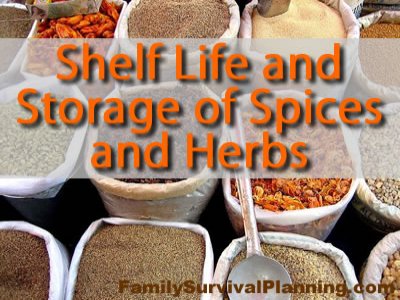- HOME
- Food Storage Basics
- Storing Spices and Herbs
'Spice' Up Your Food Storage
Shelf Life and Storage of Spices and Herbs
The quantity you store of herbs and spices will depend on how much you use. How often, for instance, do you need to buy salt, or pepper, or oregano? Salt is the most used "spice" so you would need much more of that. For instance, a family of two adults uses approximately 8-10 pounds of salt per year. As for other spices and herbs, they will lose their color, taste and aroma over time.
Invest in emergency food storage now and enjoy peace of mind for the next 25 years. Don't miss out on the savings!
To preserve peak flavor and color, they must be stored in a cool, dry place, away from exposure to bright light, heat, moisture or oxygen.
If possible, avoid storing spices and herbs too close to the stove, oven, dishwasher or refrigerator, where rising steam or heat can come into contact with them. Dampness can cause caking or clumping of ground spices.
Store herbs and spices in airtight containers, such as glass jars, plastic containers or tins, to protect against moisture and preserve oils that give spices their flavor and aroma.
The shelf life of each herb and spice is different, and all age, even under the best conditions. Check your herbs and spices and those you consider purchasing to see that they look fresh, not faded, and are distinctly aromatic. The shelf life of herbs and spices will vary according to the form and plant part, too. Those that have been cut or powdered have more surface area exposed to the air and so lose their flavor more rapidly than whole herbs and spices.
What length of time do herbs and spices remain fresh?
Freshness of herbs and spices is subject to exposure of light, heat and, especially humidity. While most people traditionally store their herbs and spices in racks above or near a cooking surface, by moving your spices to a cool, dark place, you will extend the life of your spices and herbs and they will maintain their freshness for a longer period of time.
Proper storage of herbs and spices will result in ground spices and herbs maintaining their freshness for a minimum of one year, while whole herbs and spices have the ability to last anywhere from 3 to 5 years in quality of taste.
General Shelf Life:
- Dried, whole spices and herbs: up to 3 years
- Seeds and barks: over 2 years
- Roots: over 2 years
Should spices and herbs be stored in a refrigerator?
A refrigerator contains a slight humid environment which could alter the flavor of your herbs and spices so this method is not recommended. However, as long as dried herbs and spices are stored in an air tight container, keeping larger quantities of herbs in a freezer is okay.
Red-colored spices, such as chili powder, cayenne pepper and paprika can be refrigerated to prevent loss of color and flavor. The best storage temperature for herbs and spices is one that is fairly constant and below 70º F. Temperature fluctuations can cause condensation, and eventually mold, so if you store spices in the freezer or refrigerator, return them promptly after use.
"Longer" Term Storage Methods
Since spices and herbs can only be stored for a couple of years, one of the best methods of preserving their freshness and flavor is to use a FoodSaver to vacuum seal them into 1/2 pint or pint jars. You will want to cover the top of the spices with a layer of paper towel or coffee filters so the powder or small pieces don't gum up your sealer, but it's a great shelf-stable way to store spices.
You can purchase herbs and spices in bulk from Mountain Rose Herbs or any quality source. Put one or two cups per Mylar bag and seal. You can put these smaller bags inside a larger Mylar pack and seal in a five gallon plastic bucket. They should last several years if stored in a cool, dark, moisture-free environment. Dried minced garlic and onion save well. Put only the same herbs in each bucket as the aroma of the spices or herbs will taint each other.
To truly enjoy the full flavor of quality herbs and spices, use a mortar and pestle to grind whole herbs or spices prior to using them in your recipes.
And if you're adventurous, toast whole spices in a skillet over medium heat before grinding to experience an even stronger flavor of the spice.
What do you think?
I’d love to hear what you have to say in the comments.













